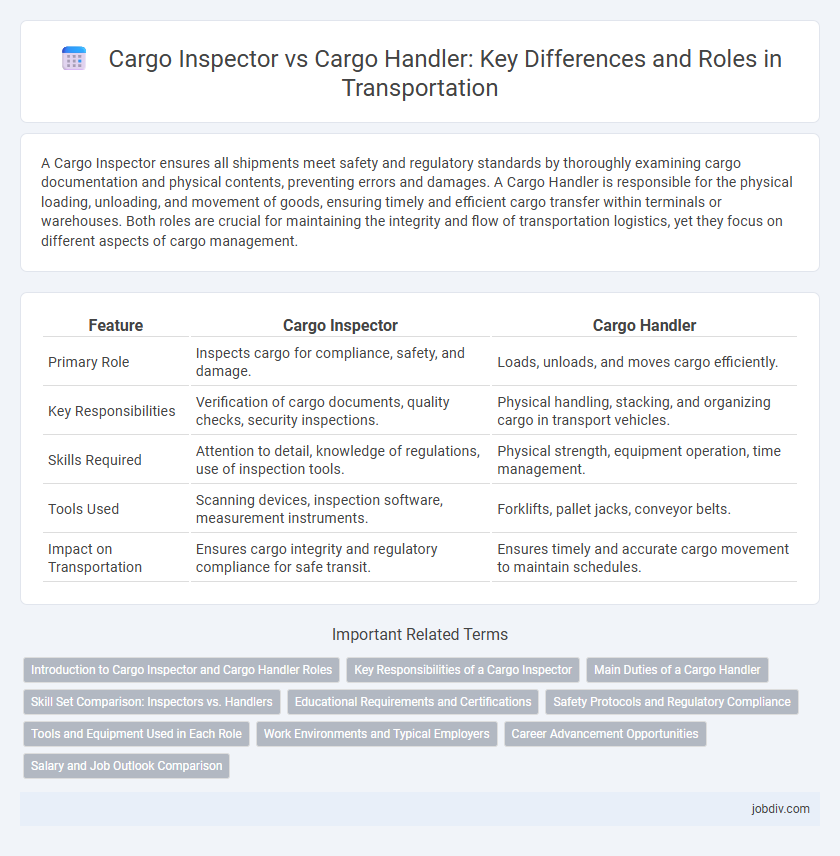A Cargo Inspector ensures all shipments meet safety and regulatory standards by thoroughly examining cargo documentation and physical contents, preventing errors and damages. A Cargo Handler is responsible for the physical loading, unloading, and movement of goods, ensuring timely and efficient cargo transfer within terminals or warehouses. Both roles are crucial for maintaining the integrity and flow of transportation logistics, yet they focus on different aspects of cargo management.
Table of Comparison
| Feature | Cargo Inspector | Cargo Handler |
|---|---|---|
| Primary Role | Inspects cargo for compliance, safety, and damage. | Loads, unloads, and moves cargo efficiently. |
| Key Responsibilities | Verification of cargo documents, quality checks, security inspections. | Physical handling, stacking, and organizing cargo in transport vehicles. |
| Skills Required | Attention to detail, knowledge of regulations, use of inspection tools. | Physical strength, equipment operation, time management. |
| Tools Used | Scanning devices, inspection software, measurement instruments. | Forklifts, pallet jacks, conveyor belts. |
| Impact on Transportation | Ensures cargo integrity and regulatory compliance for safe transit. | Ensures timely and accurate cargo movement to maintain schedules. |
Introduction to Cargo Inspector and Cargo Handler Roles
Cargo Inspectors are responsible for examining shipments to ensure compliance with safety regulations and verifying the accuracy of cargo documentation. Cargo Handlers focus on the physical loading, unloading, and secure storage of goods during transport operations. Both roles are critical to maintaining the integrity and efficiency of supply chain logistics.
Key Responsibilities of a Cargo Inspector
Cargo Inspectors are responsible for verifying the accuracy and condition of shipments, ensuring compliance with safety regulations and customs requirements. They meticulously inspect cargo documentation, perform physical examinations to detect damages or hazardous materials, and certify that shipments meet legal and quality standards. Their role is crucial in preventing shipment errors, fraud, and delays throughout the transportation and logistics process.
Main Duties of a Cargo Handler
Cargo handlers are responsible for physically loading, unloading, and securing cargo to ensure safe transport, operating equipment such as forklifts and conveyor belts. Their duties include organizing cargo in warehouses, verifying shipment details, and maintaining accurate inventory records. Unlike cargo inspectors who primarily focus on quality control and compliance checks, cargo handlers concentrate on the efficient movement and management of freight.
Skill Set Comparison: Inspectors vs. Handlers
Cargo inspectors possess specialized skills in documentation verification, risk assessment, and regulatory compliance, ensuring cargo meets safety and legal standards. Cargo handlers excel in physical labor, load securing, and equipment operation, facilitating efficient movement and storage of goods. Both roles require attention to detail, but inspectors prioritize analytical skills while handlers emphasize operational proficiency in logistics.
Educational Requirements and Certifications
Cargo Inspectors generally require a high school diploma or equivalent, with many employers preferring candidates who have completed specialized training programs in logistics or supply chain management. Certifications such as the Certified Transportation Professional (CTP) or the Certified Cargo Screening Officer (CCSO) enhance their qualifications and demonstrate expertise in cargo security and inspection protocols. In contrast, Cargo Handlers typically need a high school diploma and on-the-job training, with optional certifications like OSHA safety training or forklift operation licenses improving their job prospects and workplace safety compliance.
Safety Protocols and Regulatory Compliance
Cargo Inspectors implement stringent safety protocols by meticulously verifying cargo integrity and compliance with hazardous material regulations to prevent accidents and ensure secure transport. Cargo Handlers follow established safety procedures during loading and unloading to minimize risks of injuries and damage, adhering to Occupational Safety and Health Administration (OSHA) standards and International Air Transport Association (IATA) guidelines. Both roles play crucial parts in maintaining regulatory compliance, with Inspectors focusing on documentation and inspections, while Handlers emphasize safe physical handling practices.
Tools and Equipment Used in Each Role
Cargo inspectors utilize specialized scanning devices, X-ray machines, and detection tools to identify hazardous materials and ensure compliance with regulations. Cargo handlers rely on forklifts, pallet jacks, conveyor belts, and loading docks to efficiently move and secure goods during transportation. The combination of these tools ensures safety, accuracy, and efficiency in cargo management operations.
Work Environments and Typical Employers
Cargo inspectors typically work in controlled environments such as warehouses, ports, and customs facilities where they inspect and verify shipments for compliance and safety. Cargo handlers operate in more physically demanding settings like loading docks, freight terminals, and airports, managing the movement and securing of goods. Common employers for cargo inspectors include government agencies and logistics companies, while cargo handlers are often employed by shipping companies, airlines, and freight carriers.
Career Advancement Opportunities
Cargo Inspectors often have clearer career advancement opportunities due to their specialized skills in security protocols, compliance regulations, and quality control, which can lead to supervisory or managerial roles within logistics and customs operations. Cargo Handlers primarily focus on the physical movement and storage of goods, and while they can advance to team leader or operational supervisor positions, their progression typically requires gaining additional certifications or transitioning into administrative roles. Both career paths offer growth potential, but Cargo Inspectors benefit from a broader scope of responsibilities that align with regulatory and inspection services, enhancing upward mobility.
Salary and Job Outlook Comparison
Cargo Inspectors typically earn an average salary range of $40,000 to $60,000 annually, driven by their critical role in ensuring shipment compliance and safety regulations. Cargo Handlers usually have a lower salary range between $30,000 and $45,000, reflecting the physically demanding nature of loading and unloading goods. The job outlook for Cargo Inspectors is forecasted to grow moderately due to increasing regulatory requirements, while Cargo Handlers face steady demand tied to overall shipping and logistics industry growth.
Cargo Inspector vs Cargo Handler Infographic

 jobdiv.com
jobdiv.com